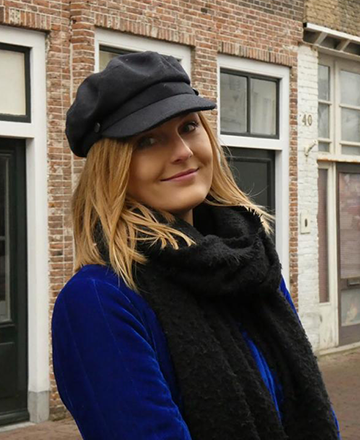Bo's decision to do a Bachelor's programme in Media, Art, Design and Architecture was a gamble, since she had long planned to study psychology. However, just before the enrolment deadline, she found out about the programme. ‘It was the right decision,’ says Bo. ‘We were a small group and the atmosphere was wonderful. The VU is like a warm bath. Its intimacy is vital to me and was a major factor in deciding to do my Master's in Heritage Studies here too.’
Critical assessment and reasoning
After her first year, Bo was torn between specialising in design or in architecture, eventually choosing the latter. Many tutorials, lectures, excursions and exhibitions later, she had learned to assess and reason critically, skills that remain vital. ‘I test my theoretical knowledge in practice. At MOOI Noord-Holland, we keep comprehensive records of Haubarg farmhouses and other agrarian heritage for the province. We’ve created a Haubarg Farmhouse Score Card after fully discussing the criteria. Having learned to express my opinion at the VU, I can engage in these discussions and know how to formulate my thoughts.’
Bo's working week is varied. With another team member, she tours North Holland to assess the nearly 5,000 Haubarg farmhouses found there, using predefined criteria. Prior to this, she researches the area, studies historical maps, detects historic traits and consults Google Cyclomedia. Fully prepared for site visits, she takes plenty of photos. ‘Evaluating the farms on-site, we often have very useful discussions.’ After the fieldwork, Bo records their findings and also helps draft the final reports before the next project begins.
Climate change
Bo decided to delay starting her work placement until she had completed everything else for her degree. Her key piece of advice: ‘Take time to do your work placement properly, not rushing through it in between other modules. Don't just do it for the sake of it. The best thing about mine was taking part in a project right through to its end. By the time I finished my work placement, I’d done everything required to complete my degree and could start working immediately.’
Bo was also forced out of her comfort zone. ‘As part of my Master's, I took the module Politics of International Heritage and researched the salinisation of the landscape. I examined climate change from a historical perspective, which was very technical in nature. I never thought I'd attempt anything like that, but thanks to the excellent guidance, I decided to. The research also contributed to a highly relevant issue: climate change.’
Bo views her studies with pleasure: the intimate small-scale nature, all the opportunities and the lecturers whose input she so appreciated. ‘During my Master's, the lecturers were like colleagues and it was very enriching to be around people keen to share so much knowledge. I fully embraced this and would recommend it to anyone.’
